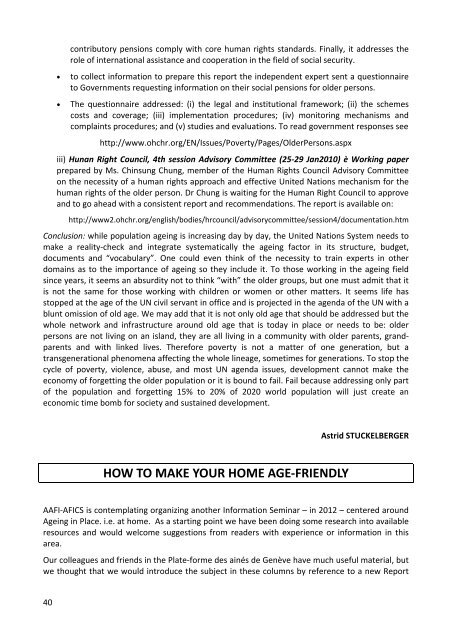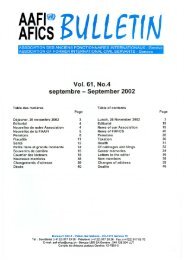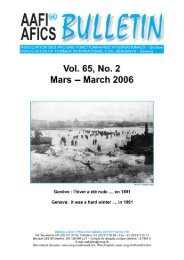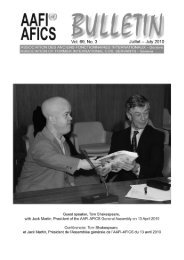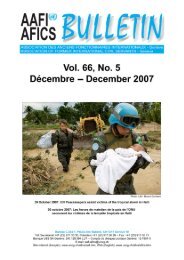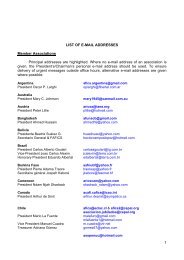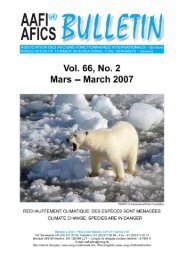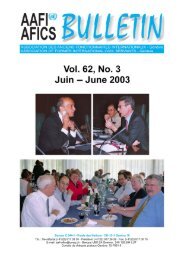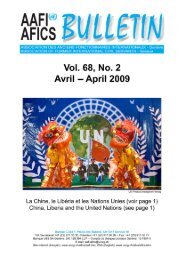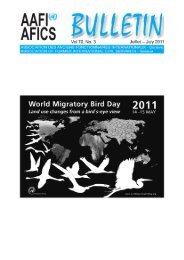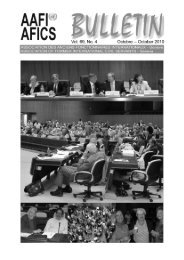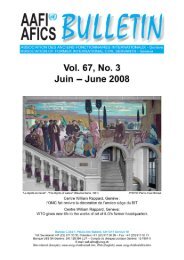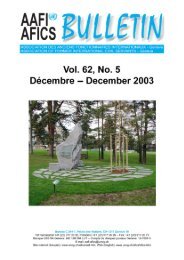VOL. 70, NO. 1 Janvier-- January 2011 - AAFI-AFICS, Geneva - UNOG
VOL. 70, NO. 1 Janvier-- January 2011 - AAFI-AFICS, Geneva - UNOG
VOL. 70, NO. 1 Janvier-- January 2011 - AAFI-AFICS, Geneva - UNOG
Create successful ePaper yourself
Turn your PDF publications into a flip-book with our unique Google optimized e-Paper software.
contributory pensions comply with core human rights standards. Finally, it addresses therole of international assistance and cooperation in the field of social security.• to collect information to prepare this report the independent expert sent a questionnaireto Governments requesting information on their social pensions for older persons.• The questionnaire addressed: (i) the legal and institutional framework; (ii) the schemescosts and coverage; (iii) implementation procedures; (iv) monitoring mechanisms andcomplaints procedures; and (v) studies and evaluations. To read government responses seehttp://www.ohchr.org/EN/Issues/Poverty/Pages/OlderPersons.aspxiii) Hunan Right Council, 4th session Advisory Committee (25-29 Jan2010) è Working paperprepared by Ms. Chinsung Chung, member of the Human Rights Council Advisory Committeeon the necessity of a human rights approach and effective United Nations mechanism for thehuman rights of the older person. Dr Chung is waiting for the Human Right Council to approveand to go ahead with a consistent report and recommendations. The report is available on:http://www2.ohchr.org/english/bodies/hrcouncil/advisorycommittee/session4/documentation.htmConclusion: while population ageing is increasing day by day, the United Nations System needs tomake a reality-check and integrate systematically the ageing factor in its structure, budget,documents and “vocabulary”. One could even think of the necessity to train experts in otherdomains as to the importance of ageing so they include it. To those working in the ageing fieldsince years, it seems an absurdity not to think “with” the older groups, but one must admit that itis not the same for those working with children or women or other matters. It seems life hasstopped at the age of the UN civil servant in office and is projected in the agenda of the UN with ablunt omission of old age. We may add that it is not only old age that should be addressed but thewhole network and infrastructure around old age that is today in place or needs to be: olderpersons are not living on an island, they are all living in a community with older parents, grandparentsand with linked lives. Therefore poverty is not a matter of one generation, but atransgenerational phenomena affecting the whole lineage, sometimes for generations. To stop thecycle of poverty, violence, abuse, and most UN agenda issues, development cannot make theeconomy of forgetting the older population or it is bound to fail. Fail because addressing only partof the population and forgetting 15% to 20% of 2020 world population will just create aneconomic time bomb for society and sustained development.Astrid STUCKELBERGERHOW TO MAKE YOUR HOME AGE-FRIENDLY<strong>AAFI</strong>-<strong>AFICS</strong> is contemplating organizing another Information Seminar – in 2012 – centered aroundAgeing in Place. i.e. at home. As a starting point we have been doing some research into availableresources and would welcome suggestions from readers with experience or information in thisarea.Our colleagues and friends in the Plate-forme des ainés de Genève have much useful material, butwe thought that we would introduce the subject in these columns by reference to a new Report40


